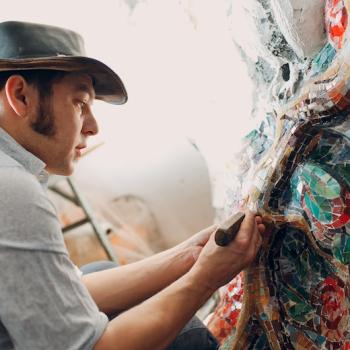
Whenever I talk about parables, I include the same reminder: a parable is a snapshot, like a photo, that conveys a core meaning. It isn’t an allegory where every detail has symbolic value. The parable in yesterday’s lectionary passage (Matt 21:33-46) comes out of Jesus’ time when the majority were tenant farmers on the lands of powerful people, and when elites tended to have slaves. The story takes these realities as a given; it doesn’t mean Jesus approved of tenant farming or slavery. The image or snapshot is making one key point.
That point is about stewardship. In this story, the owner of the land has made many investments in his vineyard. He has “planted a vineyard, put a fence around it, dug a wine press in it, and built a watchtower.” The vineyard belongs to the owner. While the tenants live and work on the farm, they are not the owners. They are meant to take care of the owner’s land as stewards. Yet when the owner sends representatives to the land to collect the harvest, the tenants act like they own the produce; they even kill the representatives. Eventually, the owner sends his son, but the tenants kill him too. In Matthew’s explanation of the parable, he explains that when the religious leaders hear the parable, they know it is about them.[1] Now again, the snapshot of this parable is about stewardship. Instead of focusing on stewardship of God’s resources, often we, like the leaders Matthew refers to, want to claim what is not our doing, but God’s.

While it is easy to feel judgment toward those in the parable who are called out, the stewardship message of this parable is directed at all of us. Think about your own life. The talents you have; the children you have; your friends; your job; your home. All are gifts. These things are like a vineyard God planted and made grow; they are the bit of land God put you in charge of—to steward and love, and then to share with gratitude. When we look at our lives, it’s important to remember that all good things come from beyond us. When we die, we don’t take anything along.
How do we go about stewarding the things God has entrusted to us, whether these are our families, jobs, talents? In part, by recognizing that nothing is ours to keep. And nothing is to be used to further our power or ego. Instead, everything we are blessed with is for the benefit of others. When Spirit prompts us to use our talents in a particular way, we must pray for willingness to do so, to further God’s dream for the world.
I think one of the key ways to live a life of stewardship and generosity is to start with gratitude. Regular practice of gratefulness—not just for the big things, but for everything—helps us recognize our gift-laden lives. It is a way of saying: I have received so much; how can I be useful?
NOTE
[1] The words in this passage about the “chief priests and Pharisees” beg comment as do all such problematic references in the Christian scriptures because, throughout Christian history, these references have been used antisemitically.
First, it is important to remind readers that Jesus and his followers were Jewish. Until the expanding ministry of Paul, the early Jesus movement was mostly a Jewish movement. People saw in Jesus a revelation of the face of God, and began grappling with what that means, as Jesus’ followers would continue to do from then on. But the Jesus Movement came into Judaism at a time of tremendous trouble and conflict with the occupying empire of Rome. Just a few decades after Jesus, a war took place in Palestine that literally changed the Jewish religion forever. Whereas it had for hundreds of years been a religion oriented around the temple—where God was represented and accessible in a special way in a place, Jewish people suddenly no longer had a place. The temple in Jerusalem was destroyed by Rome, the elites of the religion were killed, and tens of thousands of Jews were crucified in the course of what was a protracted and ultimately ill-fated insurrection.
What gradually replaced the temple in the decades after it was destroyed became known as Rabbinic Judaism. Where Jews had been a people of Place, they became, as a matter of survival, a people of The Book. The rabbis, or teachers, became the leaders, the synagogues became the centers of religion, and a beautiful new chapter in Judaism was born.
But here is what every reader should know: As the majority of Jews dealt with the loses of “the Jewish War” by following the rabbis and becoming a people of the book, the small segment of the Jewish religion that was the Jesus Movement, went another way. And the break between the two factions was destructive and bitter. Some of that destruction and bitterness is what we glimpse behind the heightened language of the gospels. This is particularly true in the Gospel of John, with its unmatched exclusivist claims about Jesus and demonizing language used for religious leaders. Evidence suggests that the group of Jesus’ followers behind the Gospel of John had been kicked out of the synagogue. This must have been an incredibly painful experience, and that pain gave way to exclusivist claims that should be understood as “fighting words,” because that is what they are.
The Gospel of Matthew also uses problematic language for religious leaders, including in this passage.
Wren, Winner of a 2022 Independent Publishers Awards Bronze Medal

















